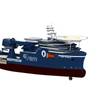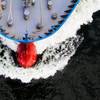The Huron Explorer, a 41-ft. former Coast Guard vessel now serving on the Great Lakes is the first modern U.S. research vessel to operate free of petroleum products. Photo credit: NOAA
A National Oceanic and Atmospheric Administration (NOAA) small research vessel is now powered by soybeans. The Huron Explorer, a 41-ft. former Coast Guard vessel now serving on the Great Lakes, is the first U.S. research vessel to operate free of petroleum products.
The vessel was given an award by the Department of Energy's Federal Energy Management Program during an Earth Day Week event on the shores of Lake Michigan.
"NOAA has a commitment to stewardship of the environment, and this research vessel, the R/V Huron Explorer, demonstrates that commitment in very practical ways. Environmentally friendly vessels are better suited to tread lightly on the ecosystems they help research," said Stephen B. Brandt, NOAA acting deputy assistant administrator for oceanic and atmospheric research.
The "You Have the Power" campaign helps federal agencies reach their energy-saving goals by raising awareness about energy efficiency at federal facilities. The federal government can encourage wise energy use, while simultaneously protecting the environment and conserving natural resources.
In 2004, the Huron Explorer, a 41-foot former U.S. Coast Guard vessel, joined the fleet of the NOAA Great Lakes Environmental Research Laboratory's other two ships that are used to conduct research on the Great Lakes. The Huron Explorer serves the NOAA Thunder Bay National Marine Sanctuary and Underwater Preserve in Lake Huron.
The other two ships, including the 67-foot Shenehon, which is one of the oldest in the NOAA fleet, use some non-petroleum products. The Shenehon began its use of B100 biodiesel in 2000 and was dubbed the "french fry" ship by some. It showed immediate reductions in visible emissions, smoke and offensive odor, with unchanged performance of the main engine or generators. The use of B100 was a significant achievement in demonstrating soy oil as an alternative fuel in marine applications. B20, a 20 percent blend of soy oil with petroleum diesel, has been in use for a number of years in road vehicles, such as cars, buses and trucks.
GLERL's Ship Operations Group, headed by Dennis Donahue, expanded the use of bio-hydraulic oil on the Laurentian, an 80-foot research vessel built in 1974. All systems using the bio-hydraulic oil performed satisfactorily without change to pump or equipment performance while contributing to improved onboard storage and reduced inventory.
In August 2005, the Huron Explorer completed its transformation from petroleum products to biofuels and lubricants by incorporating rapeseed-based hydraulic oil for its deck crane, winches, transmission and steering gear, and 100 percent soy biodiesel for engine fuel and canola-based motor oil.
"We saw dramatic reductions in emissions and improvements to the original 1974 engines in wet exhaust odor and pollution," Donahue said. "The biodegradable vegetable oils offer an additional level of environmental protection in case of a spill or leak."
Donahue added that the switch to agri-products has improved the work environment of the ships' crews and scientists.
"These ships have become real-world field studies that can be used to expand field test data and support other ship conversions," said Donahue. Other NOAA boat operations and some private vessels are implementing similar bio-product conversions based upon experiences at GLERL.
GLERL plans to convert the Shenehon's remaining systems to agri-products this year and the Laurentian is slated to convert to B100 biodiesel in 2007, making all three of the ships 100 percent petroleum-free.
Subscribe for
Maritime Reporter E-News
Maritime Reporter E-News is the maritime industry's largest circulation and most authoritative ENews Service, delivered to your Email five times per week












